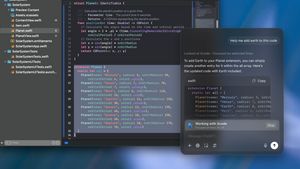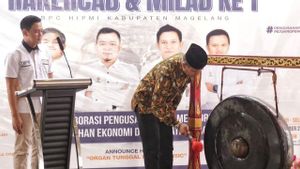When the COVID-19 pandemic was high and the government implemented strict restrictions on the movement of citizens through PPKM, the Film Censorship Institute (LSF) was also affected. However, the amount of material censored by LSF is increasing. According to LSF Chairman Rommy Fibri Hardiyanto, his party is working hard to carry out the task of censoring all film and advertising material that will be shown. The pandemic that has limited movement has made film people creative in dealing with the situation.
***
In the midst of these limitations, Rommy Fibri Hardiyanto and his entire team, in collaboration with Indosiar, succeeded in organizing the Film Censorship Institute Award celebration which had not been implemented for two years. This event was last held in 2019, after which it could not be held for two years due to the still high COVID-19 pandemic. It is only in 2021 that it can be carried out again smoothly.
According to Rommy, this award event is not just for showing off, but there is an important meaning that they want to convey through the award which is held every year. “After being suspended for two years, LSF again held the Film Censorship Institute Award, this time there was a Lifetime Achievement category. LSF wants to appreciate Indonesian film actors who have an impact on the quality of the spectacle, which prioritizes elements of education, culture and is in line with the goals, functions and principles of film," said Rommy.
Christine Hakim, who received the Lifetime Achievement award for the first time in the 2021 Film Censorship Institute Award, expressed her appreciation to LSF for giving this award. The role of Cut Nyak Dien in the film of the same name conveys his hopes for all parties, especially filmmakers and those who are involved in the Indonesian film industry. He who is willing to return from Canada to attend this award ceremony hopes that all parties can continue to learn to be more mature, and wisely face challenges and competition in the future. According to him, Indonesian filmmakers have great opportunities. Moreover, under Jokowi's leadership, Indonesia has received an extraordinary spotlight. And this moment should be used as much as possible. Not only working alone, collective work will be more effective and stronger.
It turns out that from the available data, according to Rommy, the number of films censored during this pandemic has increased even though the number of productions has stopped. "The beginning of 2020 until the end of 2020 was really a pandemic period, there was no new film production. There are no big screen films showing, because cinemas are also closed. However, the number of films censored at LSF has actually increased, reaching around 49,200 titles. Meanwhile, in 2019 there were around 46,000 titles," said Rommy Fibri Hardiyanto to Edy Suherli, Savic Rabos and Rifai who interviewed him at the VOI Office, Menteng, Central Jakarta recently. He told a lot about the censorship process during the pandemic until the 2021 LSF Award event which had the aim of motivating filmmakers to make the best work. Here is the full excerpt.

The pandemic has changed many things, including the work of filmmakers, does this also have an impact on your team's work at LSF?
In general, the pandemic also hit LSF. We continue to carry out the task of censoring films and advertisements that will be shown, LSF cannot be closed. In this case we follow the working hours set by the government. During PPKM yesterday there was WFO and WFH. So there are half that enter half do not even reduce it to 25 percent.
From the side of work like that, from the sensory side, it turns out to be quite unique too. The beginning of 2020 until the end of 2020 was really a pandemic period, there was no new film production. There are no big screen films showing because the cinema is also closed. But the number of films censored on LSF actually increased throughout 2020. The number reached around 49,200 titles. While in 2019 a year it was around 46,000 titles. This is quite an interesting phenomenon because if a new film is made, it doesn't exist for theaters. But all television (shows) except for news that is not censored, the rest is censored to LSF.
The number increased?
Yes, the number that will be shown on TV is increasing rapidly. Because the production team on television can't produce, many of them even do WFH. Television finally plays movies, old series which are quite significant in number.
The development of digital technology is so fast. Films that used to be shown in theaters because of the pandemic are now through another medium (OTT / Over the Top). Netflix, VIU, Disney Hotstar, HOOQ, etc are new tools. Should films shown on OTT be censored by LSF?
Throughout the pandemic from early 2020 to the present, the number of film productions for the big screen has significantly decreased. The reduction can be up to only 40 percent of the normal capacity. Usually, foreign films or imported films are censored in a year, between 350 and 360 titles per year. During this pandemic the number is only half. Foreign films are only 150 titles that we censor. Meanwhile, Indonesian films only have 60 titles.
However, there are production houses that still have films that have been produced but cannot be shown yet. There are also those that just aired after the pandemic. There are also those who channel their old films to OTT. This OTT has a high absorption capacity. As more people were at home, the production house did a metamorphosis by making a film for this new channel. However, in reality, not all films shown on OTT have gone through a censorship process. All films shown by the informatics network (OTT) must go through the LSF. Technological developments are very fast and almost unstoppable. What makes us happy is that now there is awareness from film producers to censor films that will be shown on OTT, although not all of them. In 2020 there were 599 films showing on OTT that were censored.

What are the crucial things that become the standard of LSF in censoring films?
There are several points that LSF pays attention to when censoring a film. First, pornography and action porn, this is clear because we have a pornographic act, which basically means that if you show an element of nudity, it's impossible for the film to be shown in Indonesia. Both aspects of violence are sadistic in nature, because they will affect the development of the audience. Is it okay for films that contain elements of violence such as blood? Yes, you may. It was classified in all ages, 13 years, 17 years and 21 years. If there is an action film, it's okay if it's safe for the category of 13 years and over. If it's still too heavy, go up to 17 years.
Then the third nafzah. Can't people use drugs in movies? Can. Shouldn't there be a scene about drugs in a movie? Can. But not a tutorial from the beginning of the use of narcotics to completion. That's not allowed. Except for education it is allowed.
The fourth is dignity and worth. So if there is a scene that is judged to undermine the dignity of both men and women and all kinds of things, it will certainly be considered by LSF.
The fifth religion. Now this is important, the issue of religious intolerance is very crucial. If there is one religion that is abused and feared will cause turmoil, security and public order, we do not want that to happen. But that doesn't mean there shouldn't be scenes in the film that smell like discussions or arguments about religion. Go ahead but as long as it's not harassing and perversion.
What about the socio-cultural aspect?
There is also another one that is socio-cultural in nature, as long as it doesn't show disturbances or deviant social aspects, it's okay. For example, our brothers in Papua are wearing their traditional clothes if they enter the film or not? Yes you can, as long as it's not exploited.
LSF in today's era of course no longer cuts film like it used to, what kind of censorship mechanism is used?
Indeed, LSF now no longer cuts film tape and reconnects it. Now we just need to provide notes, the time code is so far, please edit it, because it doesn't fit. Because now is the digital era. LSF is also very appreciative, because now the era is very democratic. We really respect the rights of filmmakers. They could even argue about the notes the LSF gave them. Our job is to tell if this scene is against the law, this scene will be dangerous. They themselves fix or edit the film.
How about soap operas made by stripping, how does LSF censor it?
For films made by stripping, we have suggested to the production house to improve the working pattern. Don't soap operas that will air at night, just shoot in the morning. That's the wrong way of working. If that's the case we can't censor it. If that is still being done, the planning is not good. So the tolerance is the day before it airs.
Our censorship is also electronic. Within one day, the censorship certificate was issued. We've used barcodes, no more wet signatures. In urgent conditions, in the morning, the film is censored in the afternoon, and in the afternoon it can be released. And the night can show. This is part of LSF's commitment to public service.
What about self-censorship discourse?
Self censorship is a literacy program that we convey to the public so that they are aware of the classification of the films they watch. Is this for all ages, 13 years and over, 17 years and over or 21 years and over. We expect all parties to have their respective alerts not to watch films that are not in accordance with the age classification. If it's not chaotic, movies are everywhere and easily accessible, the censor is within each of us.
We also hold dialogues with filmmakers for things like this. The point is, let's promote a culture of self-censorship. Filmmakers are also expected to censor films according to age classification. For films that are targeted at the age of 13, don't be selfish by giving inappropriate scenes.
What is the purpose of the LSF award which was not held for two years?
In the last two years, the LSF Award was not held due to the pandemic. Our goal is to hold this event to give appreciation to filmmakers (PH-PH), those who show films (cinema and television) and companies that distribute films (importers and exporters of films). With this award, it is hoped that it can motivate filmmakers to make good films.
This LSF award is also expected to be a marker for the rise of film production after being hit by a pandemic. Let's rise again, the pandemic is part of our friend's life. This industry must stay alive and Indonesian films must be able to become masters in their own country.
This is the story of Rommy Fibri Hardiyanto, a war journalist who now censors films

Not many journalists have the opportunity to directly cover events in conflict areas or battlefields. One of them is Rommy Fibri Hardiyanto. He has covered the Civil Emergency in Aceh, terrorism in Poso, Central Sulawesi, the conflict in Papua, and the Bali Bombings. And the most spectacular was when he was assigned to reportage to Iraq: During the Iraq War March-April 2003, when Iraqi President Saddam Hussein was captured, and when the government transitioned from the United States to the new Iraqi government.
Not only reporting for the media who commissioned him, Rommy also made a book from his journalistic work in Iraq. He wrote a book entitled Saddam's Last Moments: The Testimony of TEMPO Journalists from Baghdad, Iraq, which was co-written with Ahmad Taufik (Center for TEMPO Data and Analysis, 2008).
There is a funny story that makes Rommy can't help but laugh about the readers who tell the story of Rommy's greatness when covering the war in Iraq. Uniquely, the person concerned did not realize that the figure being told was beside him. Both are visitors to a restaurant, just different tables.
“That person told me about how heroic the journalistic work of a TEMPO reporter who was doing direct reporting in Iraq, when the country was in the midst of war. I just laughed amused hearing him tell his colleagues. At that time, my wife poked me, she said, that person was talking about you during the coverage in Iraq,” said the man who was born in Semarang, February 14, 1972, imitating his wife.
From that small incident, Rommy's subconsciously wished that he also needed to appear in front of him. So that people know more about him. The opportunity to appear in front is in the world of television which allows him to become a host or presenter in a reportage.
It turned out that his wish came true when he accepted Rosiana Silalahi's challenge to join Liputan6 SCTV with the position of Executive Producer of Liputan 6 SCTV. Together with his team he is tasked with making in-depth coverage of an event. From that event, Rommy was able to report his reportage because he was the host of the event. After so many years in charge, he finally left the world of television and returned to print media where he started his career as a journalist. He is trusted to be the Editor-in-Chief of the Prioritas Weekly Tabloid.
Becoming a member of the Film Censorship Institute was not really his dream. He was even more interested in becoming a commissioner at the Indonesian Broadcasting Commission (KPI). However, his career path turned out to be more inclined to LSF. “After taking a break from journalism, I was offered to take the fit and proper test to become a member of LSF. I was told it was only a few days before the registration deadline. In a short time I was asked to prepare all the requirements needed. "And after going through all the processes, thank God, I was trusted to become a member of LSF," said Rommy about himself being elected as a member of LSF 2015-2019.
In the next period 2020-2024 he was again trusted to continue his duties as a member of LSF. And in this period he received even greater trust. Rommy was elected as LSF Chair.
For health

In the midst of his busy schedule as LSF Chairman, Rommy really pays attention to his health. This alumnus of the Faculty of Dentistry, Universitas Gadjah Mada (UGM) regularly does jogging and ping pong. “I regularly jog, then play ping pong. The problem is that the interaction is not too heavy,” said Rommy, who chose GBK and the Bintaro Jaya Housing area for jogging locations.
But during the pandemic he was at his peak doing sports; Ping Shuai Gong and Tai Chi. “Through this sport, blood and nerves can flow. With Taichi even though the movement looks a bit but it's quite sweaty. So during Emergency PPKM, which requires us to stay at home more, I do this exercise," said the winner of the Nominee "Lorenzo Natali Prize: Excellence in Reporting Human Rights, Democracy and Development" by the International Federation of Journalists (IFJ) and the European Commission, Brussels-Belgium. (2002).
In terms of food, Rommy is now limiting his consumption of flour. “I don't eat flour, because for me flour can make me gain weight, my stomach becomes distended. It made me uncomfortable. That's why I reduced my flour intake. Besides that, I reduce cheese and milk and their derivative products," he said.
For drinks, Rommy has also reduced coffee and chocolate. "Because I used to drink a lot of coffee. Every gathering with friends must have coffee. Now for detox I cut down on coffee and chocolate. About two years ago I felt a strange feeling in my body, it turned out that after being tracked down the cause was mostly drinking coffee and chocolate. Finally, now I only drink water,” said Rommy.

To increase immunity and stamina, he diligently consumes ginger, honey and black cumin. “To be honest, I avoid vitamins or factory-made supplements. More happy with the natural course. This is enough to maintain health and fitness, feel fit in the body, “continued the man who likes rock music.
Long before serving at LSF and now being lined up as LSF Chair, he admitted that he really liked watching movies. When asked which order of films he liked, he said this. "I personally like action films first, dramas, thirds comedies, and fourthly horror films," he said.
In the midst of his busy schedule as chairman of LSF, a lecturer at a private university in Jakarta, Rommy Fibri Hardiyanto, still divides time for his family. “My wife already knows my job as a journalist without office hours. Weekend is a time to meet for quality time with family. You can eat at home or in a restaurant,” said the father of two. He has the principle of the highest position in the office, after all, a return to the family as well. Therefore, he will prioritize time for family even though he is busy censoring various film titles, as a lecturer and other activities.
“Self censorship is a literacy program that we convey to the public so that they are aware of the classification of the films they watch. Is this for all ages, 13 years and over, 17 years and over or 21 years and over. We expect all parties to have their respective alerts not to watch films that are not in accordance with the age classification,"
Rommy Fibri Hardiyanto
The English, Chinese, Japanese, Arabic, and French versions are automatically generated by the AI. So there may still be inaccuracies in translating, please always see Indonesian as our main language. (system supported by DigitalSiber.id)













